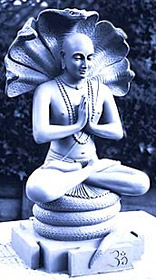 The concept of Yoga philosophy is ideally concerned with the mind. The mind is traditionally conceptualised as the "king" of the psycho-physical structure which does its bidding. Due to the relationship between the mind and body, the body must be first "chastened" through self-discipline and sanctified by various means. A sound level of overall health and psychological consolidation must be achieved before the deeper aspects of yoga can be quested for. Humans are plagued with all kinds of addictions and obsessions and these prevent the attainment of tranquil abiding (meditation). Through restraint (yama) like celibacy, staying away from drugs and alcohol and careful attention to one`s actions of body, speech and mind, the human being becomes fit to practise meditation. This discipline that one puts upon oneself is another meaning of the word yoga.
The concept of Yoga philosophy is ideally concerned with the mind. The mind is traditionally conceptualised as the "king" of the psycho-physical structure which does its bidding. Due to the relationship between the mind and body, the body must be first "chastened" through self-discipline and sanctified by various means. A sound level of overall health and psychological consolidation must be achieved before the deeper aspects of yoga can be quested for. Humans are plagued with all kinds of addictions and obsessions and these prevent the attainment of tranquil abiding (meditation). Through restraint (yama) like celibacy, staying away from drugs and alcohol and careful attention to one`s actions of body, speech and mind, the human being becomes fit to practise meditation. This discipline that one puts upon oneself is another meaning of the word yoga.
 Patañjali`s Yoga Sutras begin with the statement yoga? citta-vrtti-nirodhah (1.2), "Yoga limits the oscillations of the mind". They go on to detail the ways through which the mind can create false thinkings and recommend meditation on real objects, which process, it is said, will lead to a spontaneous state of quiet mind, the "Nirbija" or "seedless state", in which there is no mental object of focus.
Patañjali`s Yoga Sutras begin with the statement yoga? citta-vrtti-nirodhah (1.2), "Yoga limits the oscillations of the mind". They go on to detail the ways through which the mind can create false thinkings and recommend meditation on real objects, which process, it is said, will lead to a spontaneous state of quiet mind, the "Nirbija" or "seedless state", in which there is no mental object of focus.
Practices that serve to maintain for the individual the capability to access this state may be considered Raja Yoga practices. Thus Raja Yoga comprehends and differentiates itself from other forms of Yoga by encouraging the mind to avoid the sort of preoccupation in obsessional practice (including other traditional yogic practices) that can create false mental objects.
In this sense Raja Yoga is referred to as the "king among yogas": all yogic practices are seen as prospective tools for obtaining the seedless state, itself considered to be the starting point in the pursuit to cleanse Karma and obtain Moksha or Nirvana. Historically, schools of yoga that label themselves "Raja" offer students a mix of yogic practices and this philosophical viewpoint.



















